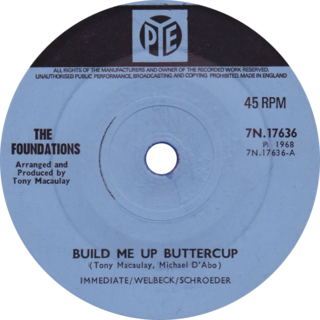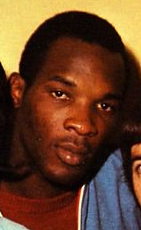Related Research Articles
The Flirtations are an all-female musical group who have recorded since the early 1960s.

The Foundations were a British soul band who were primarily active between 1967 and 1970. The group's background was: West Indian, White British and Sri Lankan. Their 1967 debut single "Baby Now That I've Found You" reached number one in the UK and Canada, and number eleven in the US. Their 1968 single "Build Me Up Buttercup" reached number two in the UK and number three on the US Billboard Hot 100. The group was the first multi-racial group to have a number one hit in the UK in the 1960s.

"Baby, Now That I've Found You" is a song written by Tony Macaulay and John Macleod, and performed by the Foundations. Part of the song was written in the same bar of a Soho tavern where Karl Marx is supposed to have written Das Kapital. The lyrics are a plea that an unnamed subject not break up with the singer.

"Build Me Up Buttercup" is a song written by Mike d'Abo and Tony Macaulay, and released by The Foundations in 1968 with Colin Young singing lead vocals. Young had replaced Clem Curtis during 1968, and this was the first Foundations hit on which he sang.

Clem Curtis was a Trinidadian British singer, who was the original lead vocalist of sixties soul group The Foundations.
The Ramong Sound was a British R&B, soul and ska band, active from 1965 to 1966.

Eric Allandale was a trombonist, songwriter, and bandleader. During the 1960s, he was in number of bands in various genres which included jazz pop and soul.
Clive Chaman is a UK-based bass guitarist and session musician, born in Trinidad and Tobago.

Mike Elliott is a Jamaican-born British saxophonist. He played on ska recordings in the early 1960s and on pop and soul music hits in the late 1960s. He is best known as a co-founding member of the British band The Foundations, and played on their hit singles "Baby, Now That I've Found You" and "Build Me Up Buttercup".
"In The Bad Bad Old Days" was a hit for The Foundations in 1969. It was the fourth hit single for the group. It was written by Tony Macaulay and John McLeod. It went to #8 in the UK Singles Chart, #7 in Ireland, and #23 in Canada. It was also covered by Edison Lighthouse, and appeared on Johnny Johnson and the Bandwagon's Soul Survivor album.
John Macleod is a Canadian-born English songwriter and musician. he co-wrote the hits "Baby, Now That I've Found You" for The Foundations, "Let the Heartaches Begin for Long John Baldry, "Heaven Knows I'm Missing Him Now" and many more.
"Any Old Time (You're Lonely and Sad)" was the third single by the Foundations. It reached number 48 on the UK Singles Chart. It was the last single they released with Clem Curtis as their lead singer. Their next single with lead singer Colin Young would give them a bigger hit with "Build Me Up Buttercup".
My Little Chickadee is a song written by Tony Macaulay and John Macleod. It was a hit for The Foundations in 1969 and has been covered by Geno Washington & the Ram Jam Band and other artists.
President Records is a British independent record label. It is one of the oldest independent record companies in the UK, originally launched in 1957 by Edward Kassner. During the 1960s and 1970s the label, and its subsidiary Jay Boy, had hits with artists including the Equals, George McCrae and KC & the Sunshine Band, Paintbox, and later focused on releasing back-catalogue compilations as well as occasional new albums by artists such as Robots In Disguise. President Records remains part of the Kassner Music Group.
"I Can Take or Leave Your Loving" is a song written by Tony Macaulay and John Macleod which was written for and originally recorded by The Foundations and it was issued as the B side of their 1968 release "Back on My Feet Again".. It was heard on the radio by Mickie Most who recognised its A side potential and quickly cut it with Herman's Hermits
Clem Curtis & The Foundations were an English soul, r&b recording and performing act who were fronted by Clem Curtis. They were formed some years after The Foundations broke up. They were entrants in the 1977 UK Eurovision contest. They also had a chart hit with "On Broadway" in 1980. One of their early members would go on to be a member of The Glitter Band. One would later join the band Hot Chocolate and another would go on to be a member of the funk band Heatwave. At times the group would alternate between the names, Clem Curtis & the Foundations and The Foundations.
Trend Records was an English Record label which existed from the late 1960s until the early 1970s. It issued recordings by such notable artists and personalities as Consortium, The Foundations, Audrey Hall, Marcus Lipton, Julie Stevens, Warm Dust and Colin Young.
Stoney Ground was a single for UK soul group The Foundations. It made it on to the US Billboard chart in 1972. It also represented the group's last charting first release of a single.
John Springate is an English singer, musician, songwriter and music producer. The hits he has composed include "Don't Make Promises " by the G. Band, "Don't Play that Song Again" for Nicki French which was also a Eurovision Song Contest 2000 song and "Nothing But Promises" for Kelly. He produced the single "A Little Boogie Woogie in the Back of My Mind" and the Let's Boogie album for Shakin' Stevens. He also played backup for Johnny Johnson and the Bandwagon and was a member of Clem Curtis & The Foundations and The Glitter Band.
Barry Class is an entrepreneur, former music store chain owner, band manager, record label founder, musical director, producer and recording studio owner. His greatest success as a manager was with the soul group The Foundations. He also managed the group The World of Oz and others.
References
- ↑ Warwick, Neil; Brown, Tony; Kutner, Jon (2004). The Complete Book of the British Charts: Singles and Albums - Neil Warwick, Jon Kutner, Tony Brown - Google Books. ISBN 9781844490585 . Retrieved 2014-02-17.
- ↑ "RPM Top 100 Singles - April 20, 1968" (PDF).
- ↑ Billboard - Foundations Singer Clem Curtis Dies at 76 By Andrew Unterberger
- ↑ Melody Maker, 17 February 1968 - Page 10 Foundations prove 'one -hit' knockers wrong - BOB DAWBARN
- ↑ Heatley, Michael. Strong Foundations – The Singles And More, Music Club MCCD 327 (1st ed.). UK: Music Club.
- ↑ Beat Instrumental, February, 1968 - Page 27 FROM MILITARY BAND TO FOUNDATIONSB.I. talks to ERIC ALLAN DALE
- ↑ "Rick Jones (7) Discography at Discogs". Discogs.com. Retrieved 2014-02-17.
- ↑ New Musical Express, No. 1097, 20 January 1968 - Page 6 MORE POP -PACKED TV Pet spec, Cilia, Freeman, Dee, Dodd guests
- ↑ New Musical Express, No. 1097 20 January 1968 - Page 4 NEW FOUNDATIONS A SCORCHER!
- ↑ JioSaavn - I Can Take or Leave Your Loving (Rerecorded) Lyrics
- ↑ Discogs - The Foundations – Back On My Feet Again
- ↑ Discogs - The Foundations – Back On My Feet Again
- ↑ Melody Maker, 10 February 1968 - Page 2 MELODY MAKER POP 30
- ↑ Disc and Music Echo, 10 February 1968 - Page 3 DISC TOP 30
- ↑ Official Charts - FOUNDATIONS, FOUNDATIONS Songs, Official Singles Chart
- ↑ RPM Weekly, Volume 9 No. 9 Week Ending 27 April 1968 - Page 1 THE RPM 100, 29 29 39 BACK ON MY FEET AGAIN
- ↑ RPM Weekly, Volume 9 No. 10 Week Ending 4 May 1968 - Page 1 THE RPM 100
- ↑ "Cash Box - International Best Sellers" (PDF). Cashbox . 15 June 1968. p. 64. Retrieved 26 July 2023.
- ↑ "Top RPM Singles: Issue 100189." RPM . Library and Archives Canada.
- ↑ "The Irish Charts – Search Results – Back on My Feet Again". Irish Singles Chart.
- ↑ "Nederlandse Top 40 – Foundations The" (in Dutch). Dutch Top 40.
- ↑ "The Foundations: Artist Chart History". Official Charts Company.
- ↑ "The Foundations Chart History (Hot 100)". Billboard.